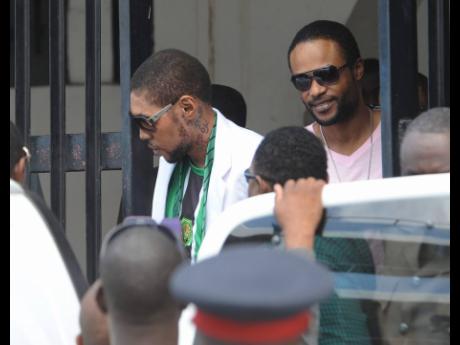Prosecution: Kartel, co-accused must ‘clear their names’
Declaring that Vybz Kartel and his co-accused must be allowed to clear their names, the prosecution says it wants the murder case to be retried on its merits and not be determined on technicalities.
“The public interest in the final determination of this criminal trial requires that such charge should not be left untried or rather for the matter to be determined on its merits,” Crown Counsel Loriann Tugwell asserted in the Court of Appeal.
Vybz Kartel, whose real name is Adidja Palmer and his co-accused, Shawn ‘Shawn Storm’ Campbell, Kahira Jones and Andre St John, were convicted of the 2011 murder of Clive Williams in 2011.
But the Privy Council, who was silent on the merits of the evidence, in March, threw out their conviction on the ground of juror misconduct.
Continuing her submission before a three-judge panel who will determine whether the case is to be retried, Tugwell, while asserting that the prosecution cares about the constitutional rights of the accused men, acknowledged that the men’s right to trial in a reasonable time has been breached.
But she argued that there are appropriate remedies in place to satisfy the breach in that there can be a public declaration and acknowledgement of the violation and an order for the expedition of the matter.
Given the length of time that the men have spent in custody, Tugwell said, bail may be considered noting that there are case law to support this position.
Bail, she added, if granted, would also allow Palmer to get treatment and to undergo surgery for Graves’ disease, thereby preserving his life to stand trial.
In light of Palmer’s medical condition, the Crown counsel said consideration could also be given for him to be granted bail.
At the same time Tugwell, in answer to the question from Justice McDonald-Bishop about whether keeping the accused in prison was not inhumane and oppressive, said Palmer despite his medical condition, which includes a failing heart, is not without hope, as surgery is recommended to improve his condition.
Bad precedent
She further added that if the court were to decide solely based on failing health against ordering a retrial, it would set a bad precedent.
Asserting that she was going down the “wrong road”, Justice McDonald-Bishop reminded Tugwell that the court has maintained that all the factors will have to be assessed in arriving at a decision.
“Don’t say that the court would sit here and decide the case based on Mr Palmer’s health alone, don’t do that to us and I know you don’t mean that,” the judge said as Tugwell quickly apologised while indicating that the health issues must not be given excessive weight.
Continuing her submission, Tugwell said, “A total acquittal or dismissal of the matter due to the delay should be the very last resort and only be reserved in extremely exceptional circumstances where it has been established that it is impossible for the appellants to have a fair hearing,
Furthermore, she said despite the breach there is nothing to suggest that a fair trial is impossible. In fact, Tugwell said, the contrary has been established.
Meanwhile, earlier in the trial, Assistant Director of Public Prosecutions Janek Forbes proposed that bail could be offered to Palmer to address his medical situation and his weakened mental state.
On the other hand, Forbes noted that if bail is not granted, the Department of Correctional Services has provisions that could also address Kartel’s mental state.
Forbes during his submission also reiterated the prosecution’s argument that the safeguards available are sufficient to mitigate any risk that the pretrial publicity may cause.
He emphasised that despite the heightened publicity in the matter, it is still possible for the men to get a fair trial.
He pointed to American celebrities such as Bill Cosby, Harvey Weinstein and South African Oscar Pistorius, whose trials proceeded despite heavy global public attention. Those cases, he said, were allowed to continue because of the “interest of justice” factor.
Additionally, he said, that while there may be a “miscreant” juror, generally it is to be assumed that the jury will abide by the oaths or affirmations.
He, however, asked the court to bear in mind the observation made by case law that “the risk that members of jury may be affected by prejudice cannot be wholly eliminated. Any member may bring personal prejudices to the jury room and equally, there will be a risk that a juror may disregard the direction of a judge when they consider that it is contrary to what justice requires.”
Meanwhile, at the start of yesterday’s preceding Justice McDonald-Bishop disclosed that it had received information from the Supreme Court that since 2018 only two matters were sent from the Court of Appeal to the Supreme Court for retrial. The two murder matters were sent back for retrial in 2022 and 2023, but no trial dates have been fixed.
In the meantime, the hearing, which is also being presided over by justices David Fraser and Paulette Williams, is set to be concluded on Tuesday.

